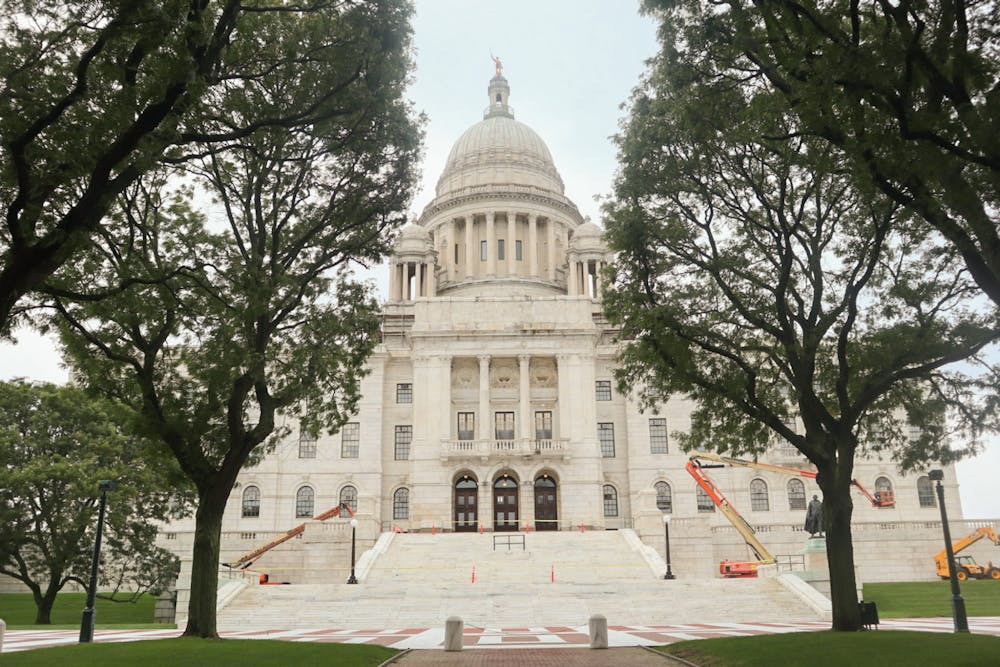Student activists criticized the two proposed voluntary payment agreements between the city and non-profit educational institutions, including Brown, at a public hearing Tuesday evening. Other residents and officials voiced support for the memoranda.
Under the memorandum of understanding, four institutions — Brown, the Rhode Island School of Design, Johnson and Wales University and Providence College — would pay a combined $177 million to Providence over the next 20 years in lieu of paying property taxes, The Herald previously reported. Under the proposed memorandum of agreement, Brown would pay an additional $46 million to the city over the next 20 years.
Providence residents, small business owners and other community members were in attendance at the public hearing. Students part of Brown Activist Coalition groups such as Sunrise Brown, Students for Educational Equity and the Student Labor Alliance, as well as members of the Graduate Labor Organization, also testified at the hearing. According to Isaac Slevin ’25, Sunrise hub coordinator, over 60 undergraduates were present at the hearing.
In an interview with The Herald, student organizer Garrett Brand ’26 said that “because so much of the city’s land is owned by nonprofits — of which Brown is the biggest by far — the city government misses out on a huge amount of property taxes every year.” According to a January 2022 report from the Providence Finance Department and the Office of then-Mayor Jorge Elorza, the University would pay close to $50 million annually if it paid full taxes on all of its properties, The Herald previously reported.
“The MOU includes text which would prohibit the City Council from taking any further steps to tax Brown, such as through an endowment tax,” Brand said.
The proposed MOU states that for the duration of the agreement, if passed, “the city shall not challenge or otherwise contest or seek to amend or circumvent through ordinance or statute or enabling legislation or any other means the tax-exempt status” of non-profit institutions.
“It’s unacceptable for Brown to use its position of economic strength to restrict the way in which a city can govern itself,” Brand said.
The University did not respond to a request for comment at press time.
SEE Co-President Niyanta Nepal ’25 said that “the new agreement is not what Brown is capable of providing to the city … there are lots of provisions that restrict the ability of the City Council to properly represent their wards” due to the restriction on pursuing further institutional taxation policies.
The hearing encouraged a diverse array of perspectives on the MOU and MOA to be heard. Providence resident and President of the Jewelry District Association Sharon Steele testified that the University gifted $5 million to improve the labor and delivery center at Women & Infants Hospital.
The money Brown donated “went to service (programs) that are utilized in neighborhoods,” Steele said. “That’s why (the money) Brown gave us this year is going to make a difference” and improve underfunded systems.
Brand disputed this framing: “Even if Brown did something good like donating to a hospital, that doesn’t mean they shouldn’t pay their taxes,” he said.
Laurie White, president of the Greater Providence Chamber of Commerce, expressed her support for the MOU at the hearing. She testified that institutions will “make the value of the investments in our neighborhoods and our communities to the extent of $162 million.” She said that, as a result of these payments, the city would still be able to fund “high-quality services and launch new initiatives.”
“This is one of the strongest PILOT initiatives in the country and it provides Providence with predictable, long-term financial support,” White said. With this agreement, institutions help “the local city, the small business community (and) the future economic development” of Providence, she added.
But it’s important to look at the whole picture, according to Slevin. Brown, which has “the highest visibility and the most expensive land in the city, gobbles up resources and drops pennies behind it in the name of philanthropy.”
“I watched the University snap up properties in the Jewelry District, taking them out of the tax base, and then asking the city … to (think) $8 million a year… is enough,” Slevin testified.
In an interview with The Herald, Slevin added that the MOA was negotiated by “the mayor and the University administration,” criticizing the lack of community engagement throughout the process.
“Rooted in a spirit of partnership and a commitment to helping Providence and its residents thrive, tentative agreements represent Brown’s sustained and deepening dedication to Providence and Rhode Island,” President Christina Paxson P’19 MD’20 wrote in a Sept. 5 message to the Brown community, highlighting the community contributions as well as monetary payments.
“In the last decade alone, we have made more than $80 million in direct payments to the city — and thanks to the work of so many students, faculty and staff across campus, we’ve served also as an invaluable community partner, through myriad services, public health initiatives, educational programs for local kids and more,” Paxson wrote.
According to a press release from the University, it is estimated that Brown will “provide community contributions valued at an average of $6.4 annually” as well as directly paying the city an average of $8.7 million annually.
“Ideally, the new agreement should include more money from Brown and should not have the (restrictive) provisions,” Brand said.
Discussion of the proposed voluntary payment agreements will continue, and the memoranda have not yet been voted on by the City Council.
Avani Ghosh is a Metro editor covering city and state politics. She is a junior from Ohio studying Health and Human Biology and International and Public Affairs. She is an avid earl grey enthusiast and can be found making tea in her free time.





